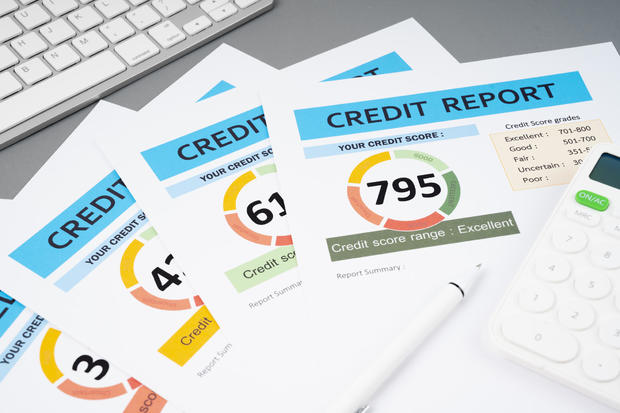Will my credit score go up if I settle my credit card debt?
The perfect financial storm is brewing for many Americans amid today's unusual economic landscape. For starters, persistent inflation has caused the cost of consumer goods to rise exponentially, making it harder for people to afford necessities like rent, gas and groceries. And, the Fed rate hikes and pauses that occurred over the last few years have led interest rates to be elevated across the board, further adding to the pressure on many people's budgets.
But even with the average credit card rate hovering above 21%, many people still have to rely on high-cost credit cards to try and make ends meet right now. As a result, credit card balances have been compounding at an alarming rate — and credit card account delinquencies are growing increasingly more common. Maxed-out card accounts have become a prevailing issue, too.
Credit card debt can cause serious damage to your finances and your credit score, though, so if you're dealing with this issue, it's important to address it and regain control of your financial well-being if you can. And, one option you have is to try and settle your credit card debt for less than what you owe. But will settling your credit card debt improve your credit score, or will it further compound your credit and financial woes?
Compare the top debt relief options available to you here.
Will my credit score go up if I settle my credit card debt?
The short answer is no, settling your credit card debt (also known as credit card debt forgiveness) will not directly improve your credit score. In fact, the process of settling debt can initially have a negative impact on your credit score. However, it is important to understand the nuances of this process — and how it can ultimately benefit your financial health in the long run.
When you settle a debt, you are essentially negotiating with your creditor, either on your own or with the help of a debt relief company, to pay less than the full amount that's owed. This arrangement is typically made when you have fallen behind on payments and are struggling to meet your financial obligations. In exchange for a lump sum payment, the creditor agrees to mark the account as "settled" or "paid in full for less than the full balance."
This notation on your credit report indicates that you did not fulfill the original terms of the agreement, which can temporarily lower your credit score. And, the process of settling a debt often involves the account being reported as delinquent or charged off before it's settled, further impacting your credit standing.
However, it is crucial to recognize that the negative impact of debt settlement on your credit score is typically less severe than the consequences of continued delinquency or bankruptcy. By proactively addressing your debt through settlement, you are taking a step toward regaining control of your finances and improving your overall creditworthiness in the long term.
And, while your credit score may take an initial hit, the benefits of eliminating a high-interest debt burden can ultimately outweigh the temporary setback. Plus, by freeing up monthly cash flow previously allocated to minimum payments, you can redirect those funds toward other financial goals, such as building an emergency fund, paying down other debts or investing in your future.
Find out more about how the right debt relief option could benefit you now.
How credit card forgiveness impacts your credit score
In addition to the damage that's caused by making delinquent payments, settled credit card accounts can remain on your credit report for up to seven years from the settlement date. So, while settling high-interest credit card debt helps resolve the outstanding balance, it can take time for your credit score to fully recover from the negative credit scoring impact of settlement.
However, the credit score decline caused by settling your debt is usually less severe than continuing to miss payments and having debts go to collections indefinitely. So, taking the steps necessary to settle and pay off that burdensome debt typically puts you in a better position long term compared to letting accounts remain delinquent over the long term.
Other credit card debt relief options to consider
While debt settlement can provide relief in challenging financial situations, it makes sense to explore all available options before deciding what route makes sense for your outstanding credit card debt. After all, alternative solutions, such as debt consolidation loans, credit counseling or enrolling in a credit card hardship program to obtain more favorable repayment terms, may be better suited to your circumstances in certain cases.
Debt consolidation loans, for example, allow you to combine multiple high-interest debts into a single, potentially lower-interest loan payment. This approach can simplify your monthly financial obligations and potentially reduce the overall interest charges you'll pay over time. However, it is important to exercise caution and ensure that you have a solid plan in place to avoid accruing additional debt while repaying the consolidation loan.
Credit counseling services can also provide valuable guidance and assistance in negotiating with creditors on your behalf. These organizations may also be able to help you secure more favorable repayment terms, such as reduced interest rates or waived fees while providing budgeting and financial management education to help you regain control of your finances.
Working directly with your creditors to reduce your credit card debt costs may be another option worth exploring. For example, if you're facing a job loss, a medical issue or another type of temporary setback, some creditors may offer credit card hardship programs or payment plans that can provide relief until your financial situation improves.
But no matter what option you choose, it's crucial to carefully weigh the potential long-term consequences of each option on your credit score and overall financial well-being. Seeking professional guidance could help, as the right debt relief expert may be able to help you navigate the complexities of each option and make an informed decision that aligns with your goals and priorities.
The bottom line
While settling your credit card debt may initially have a negative impact on your credit score, it can ultimately prove to be a stepping stone toward regaining financial stability and improving your creditworthiness in the long run. So, it can make sense to take that path in certain cases, even with the temporary impact to your credit. And by proactively addressing your debt and exploring all available options, you can pave the way for a brighter financial future, one that's free from the burden of high-interest consumer debt.






